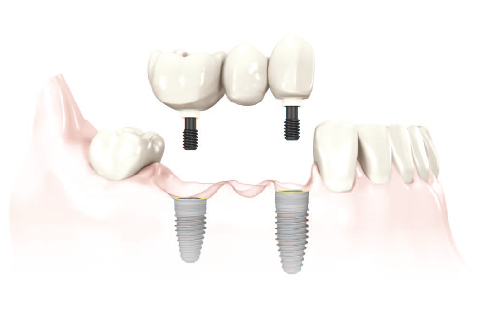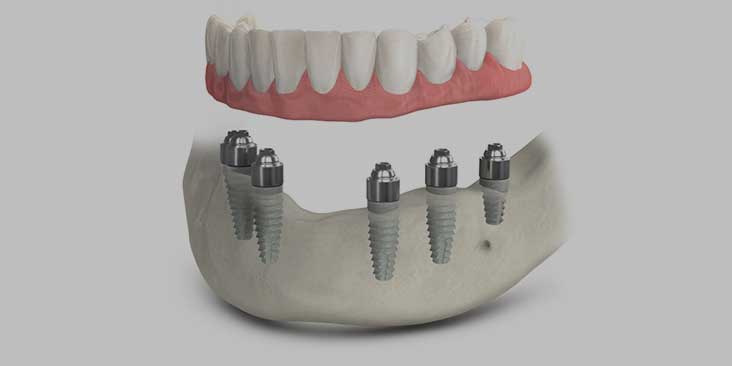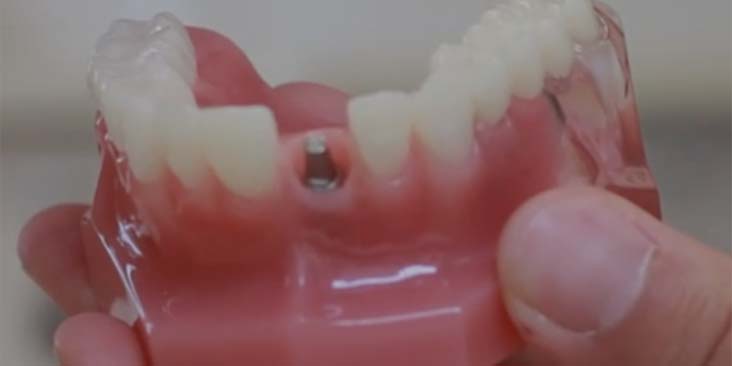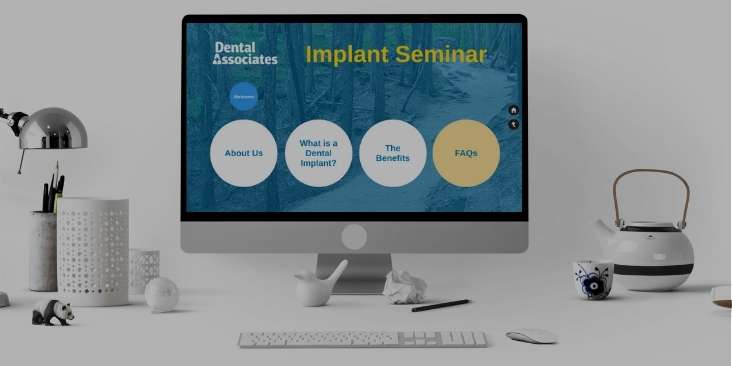Dental Implants for Multiple Missing Teeth
Dental implants are the gold standard in dentistry for replacing multiple missing teeth. If you have multiple missing or severely damaged teeth, you may be familiar with one or more of these dental issues:
- Difficulty chewing food. When multiple teeth are missing from your mouth, you may find chewing food to be difficult and uncomfortable.
- Shifting of adjacent teeth. Multiple missing teeth can cause otherwise healthy adjacent teeth to be negatively impacted due to shifting of teeth over time.
- Gum disease, poor dental hygiene, and bad breath.
- Bone loss. When teeth are missing from the mouth, your body naturally tries to heal itself. Unfortunately, this natural healing process causes bone resorption.
- Avoidance of talking or smiling. Those missing teeth in prominent places in their mouth often avoid talking or smiling when around others.
For those with multiple missing or failing teeth, there are three main treatment options:
- A removable partial denture
- A fixed bridge supported by multiple teeth
- An implant-supported bridge
A removable partial denture uses clasps to grab onto adjacent, healthy teeth to hold the denture in place. The clasps, which are designed to fit snuggly onto the healthy teeth, put pressure on the underlying gums and natural teeth they hook onto. This weakens the jawbone and loosens the supporting teeth, which often leads to additional tooth loss. Since there’s no root system for the missing teeth, the integrity of the jawbone is compromised and bone loss (atrophy) accelerates, resulting in rapid bone deterioration.
A multiple tooth-supported fixed bridge is a traditional tooth replacement option and has all the complications, compromises and risks of a single tooth bridge, only to a much greater degree. Problems of decay, root canal infections, periodontal bone loss and bone atrophy can worsen simply because there are more teeth involved. Unfortunately, larger bridges fail faster than single tooth bridges.
However, dental implants are the best and longest lasting alternative to replacing multiple missing or failing teeth. Dental implants are the most natural looking and feeling tooth replacement and will keep you smiling for years to come with very low maintenance.
Dental implants for multiple missing teeth can do the following:
- Stop the bone resorption process (deterioration)
- Are much more comfortable and stable than partial dentures
- Maintain the integrity of the facial structure (no sagging jaw line)
- Keep the gum line intact since it won’t be worn away by metal clasps
- Restore natural biting and chewing capacity
- Preserve adjacent natural teeth
- Allow you to eat foods you couldn’t eat before, such as steak, corn on the cob, apples, sticky snacks, and more
- Look, function, and feel just like natural teeth
- Provide a permanent tooth-replacement option – you won’t have to deal with messy denture adhesives or cleaning solutions anymore!
Watch this short video to learn more about dental implants for multiple missing teeth:
Benefits of Replacing Multiple Missing Teeth with Dental Implants
An implanted-supported crown is far superior to a traditional tooth-supported dental bridge. Here’s why:
- A long-term solution. A dental bridge or partial denture may have a more affordable upfront cost, but it’s not a permanent tooth-replacement option. Often, bridges and dentures need to be maintained and even replaced throughout your life, which can be more costly down the road. Dental implants have a 97% success rate, which is significantly higher than any other tooth-replacement option.
- Standard of care. Dental implants are recognized as the “standard of care” today for missing teeth because the jawbone will bond with the titanium implant and provide a strong base for the new crown. The result is a stable and strong replacement that looks, feels, and functions just like natural teeth.
- Preservation of surrounding teeth. Your adjacent natural teeth will be preserved with a dental implant rather than being grounded down and destroyed from a bridge.
- Ease of care. Since dental implants function like a natural tooth, you simply need to care for them as you would for other natural teeth with good daily oral hygiene.

An implant-supported bridge is far superior to removable partials or multiple tooth-supported fixed bridges.
Multiple Dental Implant Procedure
The dental implant team at Dental Associates will ensure you feel comfortable and understand the dental implant procedure each step of the way.
- Consultation and treatment planning. The procedure to replace multiple missing teeth with dental implants can differ depending on your individual case. Our team will consult with you to determine the best plan for your situation and prepare you for the upcoming procedure and recovery period.
- Implant placement. Placing multiple dental implants is a relatively minor procedure and can sometimes only require local anesthesia. If needed, our team can use sedation to ensure you feel comfortable throughout the procedure. During the procedure, multiple (depending on your specific treatment plan) titanium fixtures will be placed in the jaw leaving surrounding natural teeth intact.
- Recovery time. After your dental implants are placed the healing and recovery time can take anywhere from three to six months, depending on how your body responds and the state of your current health. This time allows the implant to integrate into the bone. You’ll likely see the dentist that placed the implant a couple of times for postoperative checks. Once your implants are fully integrated into the jawbone, you’ll see your regular dentist or a prosthodontist to then have the implants restored by placing abutments and an implant-supported bridge.
Multiple Dental Implants Cost
The cost of dental implants is determined by your individual case; some cases are more straight forward while others require extractions and/or bone grafting to prepare for the implant placement, which impacts the final cost. Another factor that determines the cost of dental implants is your insurance coverage. Dental insurance covers implants at different levels, and we may be able to offer additional savings through CarePlus dental insurance.
Overall, it’s important to remember that dental implants are an investment in your future: they will improve your overall oral health, your quality of life, and your confidence for years to come.



